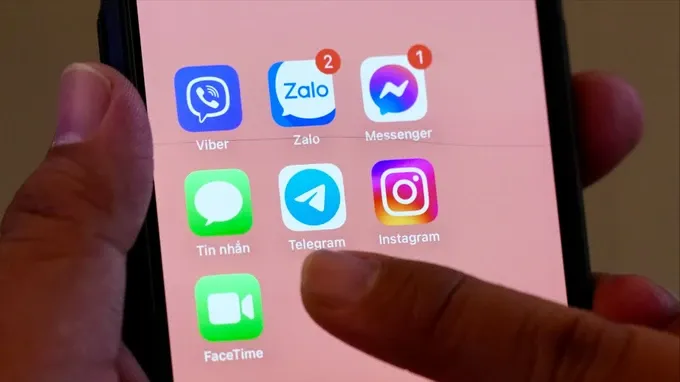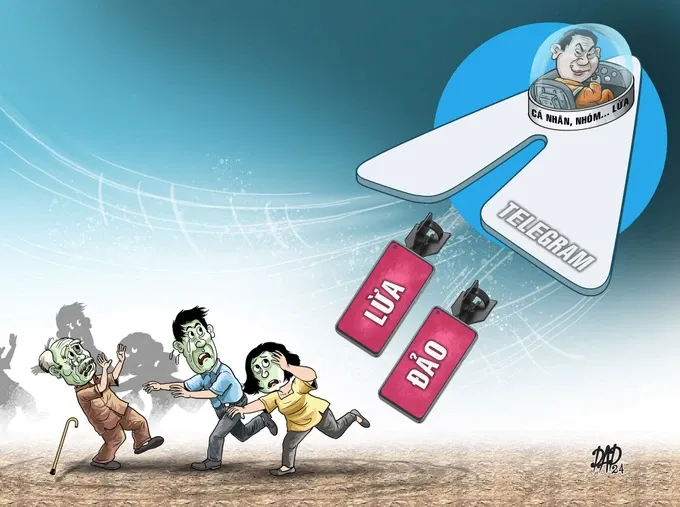
Many companies and individuals use Telegram for work and communication due to its security, convenience, free-of-charge nature. Users in Vietnam have gradually switched to Telegram, with over 31.5 percent of internet users aged 16-64. As it has become more popular, Telegram users have also become “easy prey” for online scammers.
Cunning scams involving property theft via the Telegram platform include easy jobs with lucrative salary, fraudulent recruitment, tasks for rewards, and investment calls. Scammers would add Telegram users to a chat group, claiming to need people to perform easy tasks with a small deposit at first to earn increasing profit gradually. When users trustingly deposit this little sum to accept the task, the perpetrators create a community of members in the chat group, with a false image of having received the money to lure victims into the trap.
Telegram users can change their names multiple times without being required to verify their identity by the app as with other applications. Telegram also allows senders to delete all chat messages for both the sender and receiver. Taking advantage of this, scammers can frequently change their Telegram nicknames and profile pictures to chat with victims, making it easier to deceive them.
Since late 2023, law enforcement agencies in Vietnam have repeatedly warned about organizations and individuals exploiting Telegram for scams. Specifically, in May 2024, the Nam Dinh Province Public Security Department prosecuted two individuals who created over 50 Telegram chat groups with over 25,000 members to broker prostitution and then scam and appropriate billions of VND in deposits.
Recently, Nguyen Huu Dat (25 years old, residing in HCMC) and his accomplices, who embezzled property, were brought to trial by the Ba Ria-Vung Tau Provincial People's Court. The defendants created over 10,000 Telegram groups to lure investments and trick 100 victims, causing losses of over VND35 billion (US$1.42 million).

Cybersecurity experts stressed that Telegram scams are relatively easy because the platform allows for the creation of groups with a large number of members for free, and the content on the app is not controlled. Additionally, with open-source code, scammers can create multiple fake accounts, post false information, making participants feel genuine and believe that many people are making money and winning prizes.
According to data from Kaspersky, from May to June 2024, the number of posts related to scam discussions, stolen database sharing, and various other illegal services such as illegal withdrawals, document forgery, or DDoS attacks increased by 53 percent compared to the same period last year.
"Recently, Telegram has tended to become a platform for hacktivists to express their political views and stances. Taking advantage of Telegram's large user base and ability to quickly disseminate content, hacktivists use this platform as a powerful tool to incite DDoS attacks and other forms of sabotage against target infrastructure. At the same time, criminals can publicly disclose data stolen from organizations that they attack through secret channels on Telegram, so users need to be extremely cautious," warned Alexey Bannikov, a security analyst at Kaspersky.
Telegram is a “cross-border” application and does not have a legal entity in Vietnam. In Vietnam, Decree No.13/2023/ND-CP on personal data protection came into effect in July 2023, stipulating the basic principles of personal data protection, laying the initial foundation for perfecting the legal system on personal data protection, and setting out the principle that organizations and businesses must strictly comply with both management and technical requirements in protecting personal data.
Meanwhile, the Law on Cybersecurity 2015 stipulates that organizations and individuals collecting and using personal information must have the consent of the subject regarding the scope and purpose; only use personal information for purposes other than the original purpose with the consent of the subject; and not provide, share, or disseminate personal information that they have collected, accessed, or controlled to third parties.
























